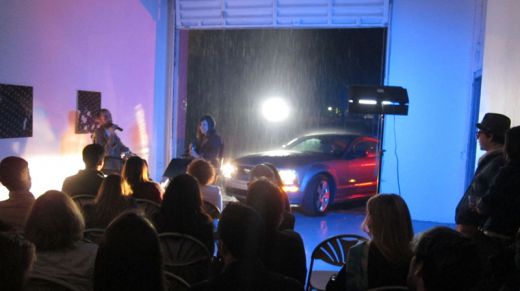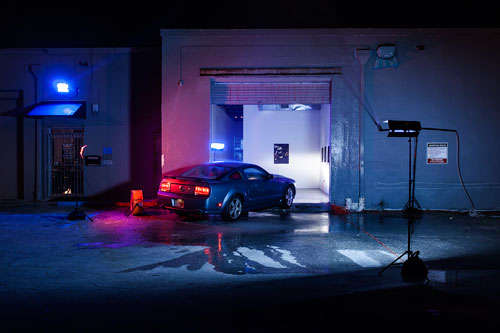Alan Gutierrez: Nobody Knows Me Better Than You
Hunter Braithwaite

Alan Gutierrez in conversation with Amanda Sanfilippo. All images courtesy Locust Projects.
Locust Projects
A few days before opening night, Alan Gutierrez took me to the Locust Projects storage room to mix up a batch of his newly invented Locustinis. The drink depends on LP’s drink sponsors at the time and on that cool January evening, it was a creamy brown swamp of Vita Coco coconut water, Tito’s vodka, and iced tea. But instead of cracking open one of Richard Prince’s special edition Arizona Ice Tea cans that are kept in a cute wicker basket, the Miami artist opted for a generic jug from the bottom of the fridge. Why, I asked. “Have you read the ingredients? They’re filled with gross chemicals.”
It was a quick takedown of Prince, and yes—such is the danger of embalming the artist, creating first art, and then glycerine-veined product. But that’s not why I bring it up. I do so because the communal act of artist and writer ensconcing unsupervised to the back room of an alternative art space to drink vodka and coconut water is something that seems peculiarly of Miami. There’s freedom here, but we must struggle to push that past free drinks.
Gutierrez is one of handful of local artists thinking about this freedom, and his flexible practice (sculpture, video, painting, performance, writing, curating, basically whatever you want) catalogues the opportunities and obligations of a cultural producer in Miami. His current show spreads out from Locust’s back room, which is fitting because the work deals primarily with planning, fabricating, and storing experience. Gutierrez is in the process of making a production studio, complete with colored lamps, a fog machine, a rain machine, and a stereo. On the opening night, a Ford Mustang was partially parked in the gallery, its headlights directed on a wall of small and understated paintings. And if one ventured past the pouring sheet of rain positioned just outside the open rolling door, they’d see that the same blue gel that colors one of the lights was also used on Locust’s exterior floodlights.

Gutierrez also has at the metaphorical space of the exhibition. He carpet-bombed the Facebook event page with quotes from Jan Verwoert, Boris Groys, and Helena Mattsson, and he turned the artist talk (with Amanda Sanfilippo) into this weird Charlie Rose meets Yo! MTV Raps performance in which he talked about the conceptual underpinnings of the project while refusing to turn down the music. (The music was a playlist of songs containing the words work or werk in the titles). The last gesture was raucous, and frustrating, and completely on point here in our city of Basel Conversations.
Even the length and completion of the exhibition were splintered and reset. The exhibition length is industry standard, but it will change several times throughout, as Gutierrez stages different iterations. The Mustang was the first, and there is talk of motorcycles fulfilling a similar role, as well as forays into the worlds of liquid nitrogen and chromakey paint. Those aren’t confirmed, but it is precisely the provisional element here, the notion that nothing is settled and is always in a process of being invented, that is key to this work. It would also be its downfall were Gutierrez not such a nimble orchestrator.
He is adept at creating situations and then forcing the viewer to accept their staged quality. In the end, there is a coolness summed up in the title of the exhibition. Nobody knows me better than you. Similar words have probably been said, at some point in history, by one friend to another. But those words do not stay long in the land of warmth and interpersonal affect. They slowly harden and crystalize into a lurid and emotionless pop ballad. It’s a much better name than Locustini.










